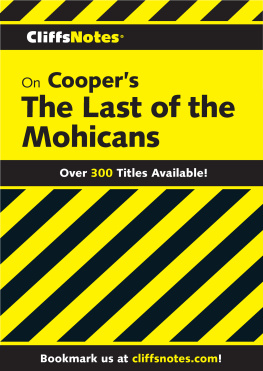Copyright 1982 Houghton Mifflin Harcourt Publishing Company
All rights reserved.
www.hmhco.com
cliffsnotes.com
For information about permission to reproduce selections from this book, write to or to Permissions, Houghton Mifflin Harcourt Publishing Company, 3 Park Avenue, 19th Floor, New York, New York 10016.
The publisher and the author make no representations or warranties with respect to the accuracy or completeness of the contents of this work and specifically disclaim all warranties, including without limitation warranties of fitness for a particular purpose. No warranty may be created or extended by sales or promotional materials. The advice and strategies contained herein may not be suitable for every situation. This work is sold with the understanding that the publisher is not engaged in rendering legal, accounting, or other professional services. If professional assistance is required, the services of a competent professional person should be sought. Neither the publisher nor the author shall be liable for damages arising herefrom. The fact that an organization or website is referred to in this work as a citation and/or a potential source of further information does not mean that the author or the publisher endorses the information the organization or website may provide or recommendations it may make. Further, readers should be aware that Internet websites listed in this work may have changed or disappeared between when this work was written and when it is read.
Trademarks: CliffsNotes, the CliffsNotes logo, Cliffs, cliffsnotes.com, and all related trademarks, logos, and trade dress are trademarks or registered trademarks of Houghton Mifflin Harcourt Publishing Company. All other trademarks are the property of their respective owners. Houghton Mifflin Harcourt is not associated with any product or vendor mentioned in this book.
eISBN 978-0-544-18083-3
v1.0616
William Shakespeare Biography
Many books have assembled facts, reasonable suppositions, traditions, and speculations concerning the life and career of William Shakespeare. Taken as a whole, these materials give a rather comprehensive picture of Englands foremost dramatic poet. Tradition and sober supposition are not necessarily false because they lack proved bases for their existence. It is important, however, that persons interested in Shakespeare should distinguish between facts and beliefs about his life.
From one point of view, modern scholars are fortunate to know as much as they do about a man of middle-class origin who left a small English country town and embarked on a professional career in sixteenth-century London. From another point of view, they know surprisingly little about the writer who has continued to influence the English language and its drama and poetry for more than three hundred years. Sparse and scattered as these facts of his life are, they are sufficient to prove that a man from Stratford by the name of William Shakespeare wrote the major portion of the thirty-seven plays which scholars ascribe to him. The concise review which follows will concern itself with some of these records.
No one knows the exact date of William Shakespeares birth. His baptism occurred on Wednesday, April 26, 1564. His father was John Shakespeare, tanner, glover, dealer in grain, and town official of Stratford; his mother, Mary, was the daughter of Robert Arden, a prosperous gentleman-farmer. The Shakespeares lived on Henley Street.
Under a bond dated November 28, 1582, William Shakespeare and Anne Hathaway entered into a marriage contract. The baptism of their eldest child, Susanna, took place in Stratford in May, 1583. One year and nine months later their twins, Hamnet and Judith, were christened in the same church. The parents named them for the poets friends Hamnet and Judith Sadler.
Early in 1596, William Shakespeare, in his fathers name, applied to the College of Heralds for a coat of arms. Although positive proof is lacking, there is reason to believe that the Heralds granted this request, for in 1599 Shakespeare again made application for the right to quarter his coat of arms with that of his mother. Entitled to her fathers coat of arms, Mary had lost this privilege when she married John Shakespeare before he held the official status of gentleman.
In May of 1597, Shakespeare purchased New Place, the outstanding residential property in Stratford at that time. Since John Shakespeare had suffered financial reverses prior to this date, William must have achieved success for himself.
Court records show that in 1601 or 1602, William Shakespeare began rooming in the household of Christopher Mountjoy in London. Subsequent disputes between Shakespeares landlord, Mountjoy, and his son-in-law, Stephen Belott, over Stephens wedding settlement led to a series of legal actions, and in 1612 the court scribe recorded Shakespeares deposition of testimony relating to the case.
In July, 1605, William Shakespeare paid four hundred and forty pounds for the lease of a large portion of the tithes on certain real estate in and near Stratford. This was an arrangement whereby Shakespeare purchased half the annual tithes, or taxes, on certain agricultural products from sections of land in and near Stratford. In addition to receiving approximately ten percent income on his investment, he almost doubled his capital. This was possibly the most important and successful investment of his lifetime, and it paid a steady income for many years.
Shakespeare is next mentioned when John Combe, a resident of Stratford, died on July 12, 1614. To his friend, Combe bequeathed the sum of five pounds. These records and similar ones are important, not because of their economic significance but because they prove the existence of a William Shakespeare in Stratford and in London during this period.
On March 25, 1616, William Shakespeare revised his last will and testament. He died on April 23 of the same year. His body lies within the chancel and before the altar of the Stratford church. A rather wry inscription is carved upon his tombstone:
Good Friend, for Jesus sake, forbear
To dig the dust enclosed here;
Blest be the man that spares these stones
And curst be he that moves my bones.
The last direct descendant of William Shakespeare was his granddaughter, Elizabeth Hall, who died in 1670.
These are the most outstanding facts about Shakespeare the man, as apart from those about the dramatist and poet. Such pieces of information, scattered from 1564 through 1616, declare the existence of such a person, not as a writer or actor, but as a private citizen. It is illogical to think that anyone would or could have fabricated these details for the purpose of deceiving later generations.
In similar fashion, the evidence establishing William Shakespeare as the foremost playwright of his day is positive and persuasive. Robert Greenes Groatsworth of Wit, in which he attacked Shakespeare, a mere actor, for presuming to write plays in competition with Greene and his fellow playwrights, was entered in the Stationers Register on September 20, 1592. In 1594 Shakespeare acted before Queen Elizabeth and in 1594 and 1595 his name appeared as one of the shareholders of the Lord Chamberlains Company. Francis Meres in his Palladis Tamia (1598) called Shakespeare mellifluous and hony-tongued and compared his comedies and tragedies with those of Plautus and Seneca in excellence.
Shakespeares continued association with Burbages company is equally definite. His name appears as one of the owners of the Globe in 1599. On May 19, 1603, he and his fellow actors received a patent from James I designating them as the Kings Men and making them Grooms of the Chamber. Late in 1608 or early in 1609, Shakespeare and his colleagues purchased the Blackfriars Theatre and began using it as their winter location when weather made production at the Globe inconvenient.
Next page












